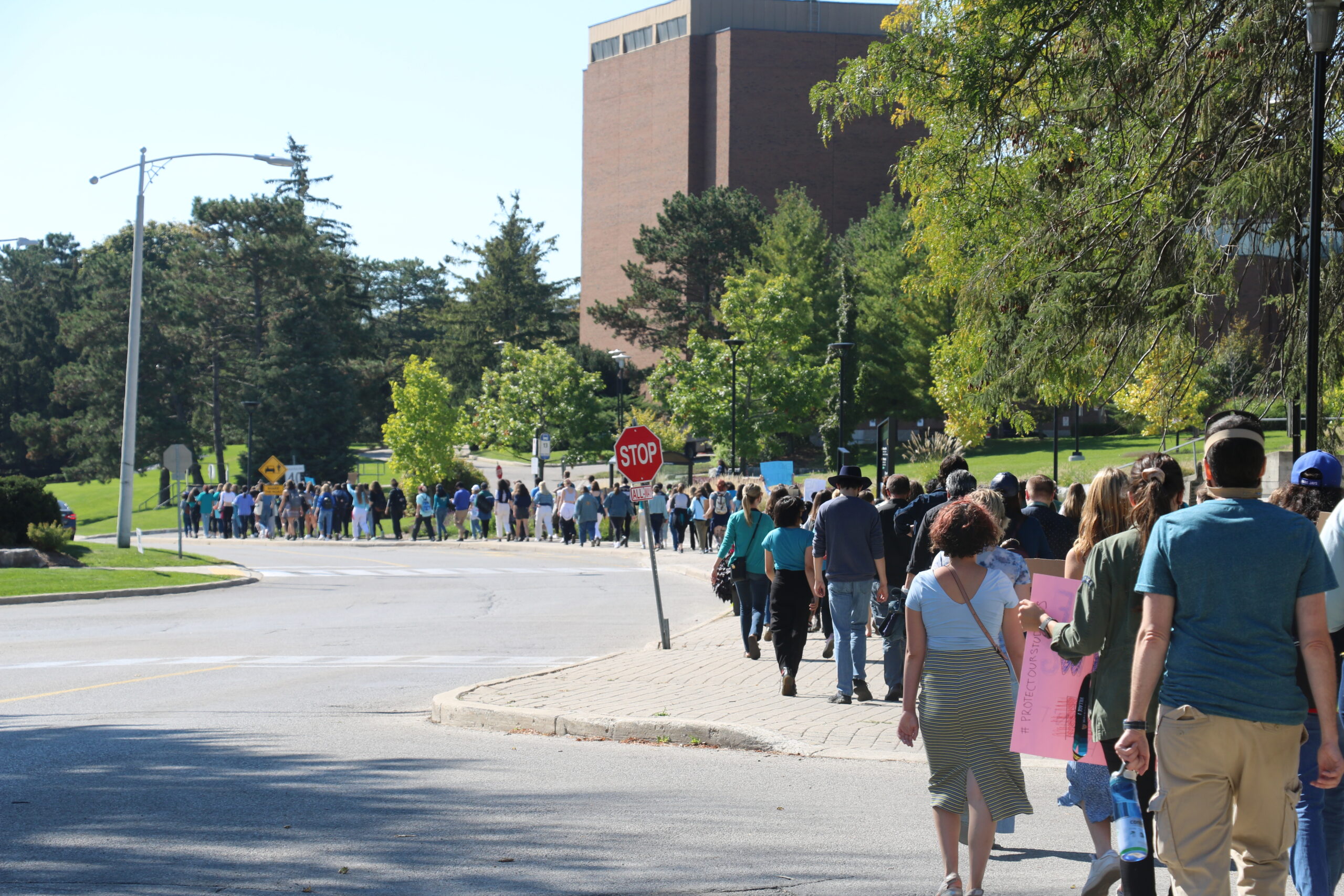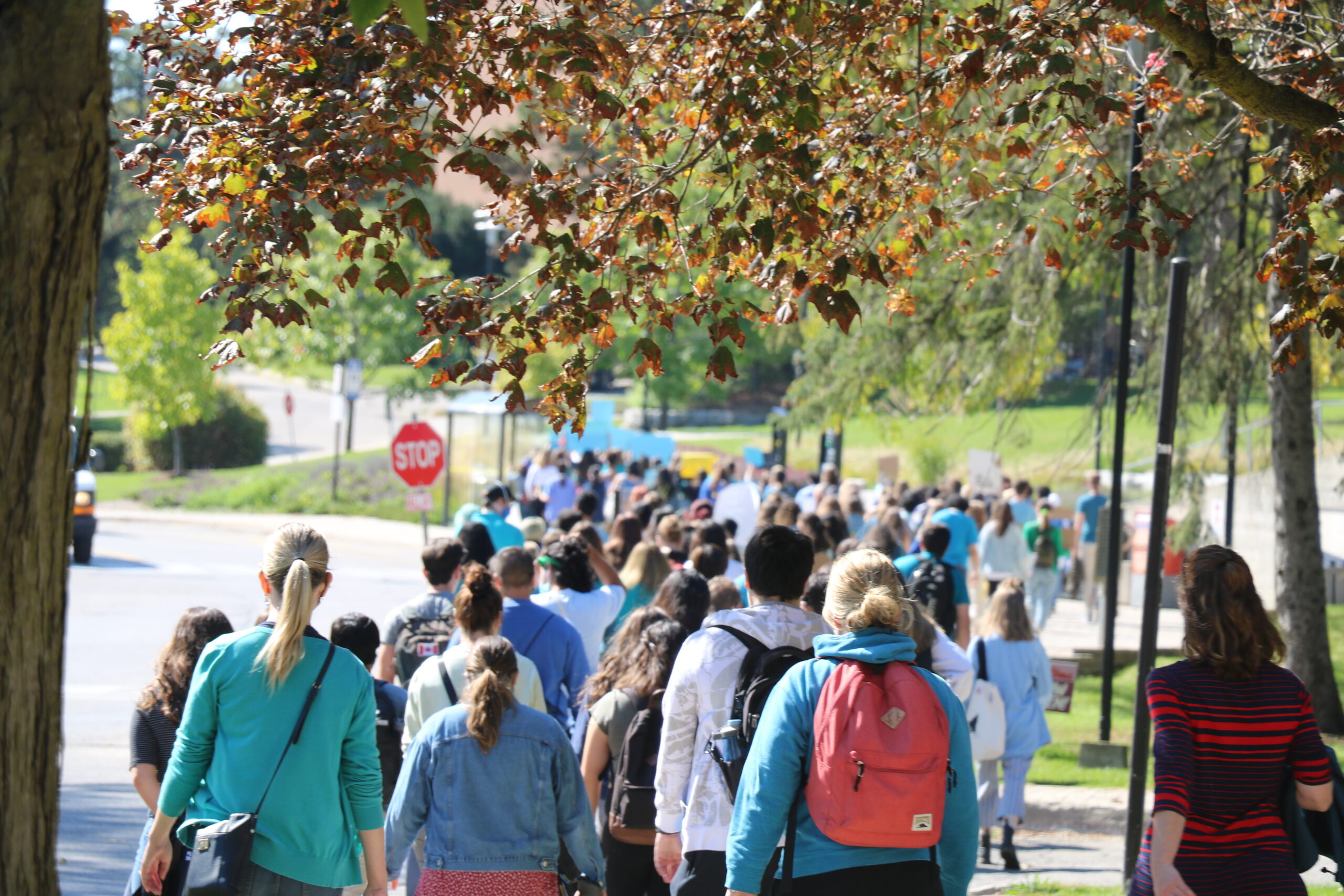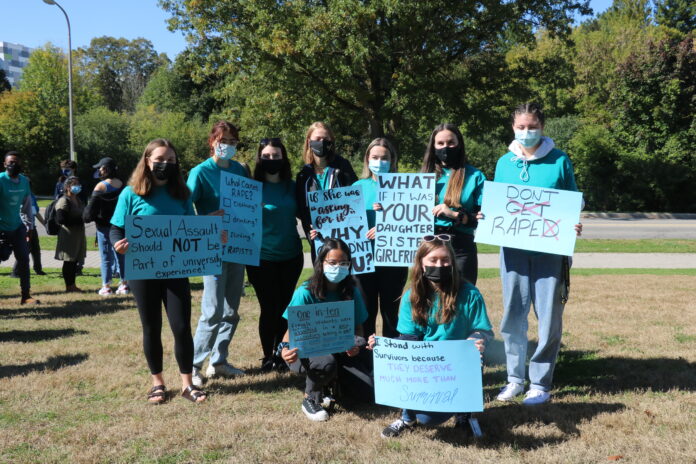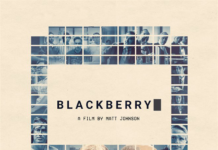CONTENT WARNING: This article discusses sexual assault and sexual violence. If you’ve been affected by sexual violence and are in need of help, visit the Sexual Harassment and Assault Research Exchange to find a crisis centre near you. If you are impacted by this story, resources are available at the end of this article.
Students, staff, faculty and community members at the University of Waterloo rallied together in solidarity with sexual violence survivors during a march on Oct. 1.
The event, which saw more than 100 participants walk along Ring Road, was organized by UW Solidarity, a student-run collective created specifically for the march. UW knowledge integration students Sophia Richardson and Allen Lu said they wanted to show support for student survivors on university campuses including Western University, following allegations of more than 30 women being sexually assaulted during the university’s orientation week.

“We believe that this is a huge issue that exists not just at Western University…but it [also exists] on university campuses everywhere,” Richardson said. “Here at the University of Waterloo, we’re stereotyped as this really academic, low-key type school that doesn’t have any partying or that type of stuff going on, when the reality is that it is something…that we do have to deal with and want to publicly condone.”
Richardson added that the goal of the march was “to change assault culture on campus, to create a safer environment for survivors of sexual assault and to condemn the action of the people who assault.”
In February 2020, the Council of Ontario Universities reported that 59 per cent of surveyed UW students had experienced sexual harassment. In September of that same year, Statistics Canada reported that around one in 10 students who identify as women were sexually assaulted in a post-secondary setting in 2019.
At UW, the Sexual Violence Prevention and Response Office (SVPRO) offers students, faculty, staff and visitors to campus various supports and resources if they have experienced, witnessed or been accused of sexual assault or sexual violence.
“Anyone who has a connection into the University of Waterloo, who’s either directly experienced violence, supported someone who’s experienced sexual violence, responded to someone who’s made a disclosure, someone who’s been a bystander, or folks who have caused harm can all connect with our office,” said Meaghan Ross, the sexual violence response coordinator at SVPRO.
“The other part of what we do is just lots of education,” Ross continued. “Some of that looks like creating events for folks to engage and raise awareness, some of that looks like doing some training.”
Ross added that SVPRO aims to be as accessible as possible, since students at Western University called for an increase in resources and supports for sexual violence survivors.
“We are really supportive of the fact that students’ voices need to be centred in this conversation around sexual violence on campus,” she said.
Richardson mentioned that although UW offers numerous resources for sexual assault survivors, if students aren’t aware of those resources, this contributes to the culture of misinformation and sexual violence in the campus community.
“Although our march itself isn’t calling for direct actions from the university, what we’re calling for is actions from the community of University of Waterloo students and faculty to really change their mindset and create a supportive culture force for sexual assault survivors,” she said.

In addition to the march, community members were also invited to write “love letters” to survivors. Richardson said the letters will be shared on UW Solidarity’s Instagram account as well as in a public space on campus.
Second-year psychology student Julia Gorbet said it was important for her to write a letter as a sexual assault survivor.
“I know how important any support can be for people who have been through sexual violence,” she said.
Gabriel Lamonica-Sleczkowski, a second-year physics and astronomy student, also expressed his interest in supporting sexual assault survivors.
“While I am not a survivor…I have known many people who have been [sexually assaulted] and I just want to show my love and support as best as I possibly can,” Lamonica-Sleczkowski said.
Seventy-two-year-old Catherine Hayes, a mature student in gender and social justice at UW, said she attended the march because she saw an advertisement for the event online and thought it would be a good opportunity to show her support.
“The situation in London [Ont.] was just totally terrible. And then you do hear other reports on campuses. I have a feeling that Waterloo has a little better handle on it than some. That said, I felt it was important and I was able to do it,” Hayes said.
Although UW Solidarity was created specifically for the march, Richardson said more events and ideas are on the horizon.
“At the moment, this is the only goal we had with the account is to really use it as a platform to promote the event and get people out there and get people talking about it,” she said. “We’ve had had conversations about it going forward to further the movement of supporting sexual assault survivors and changing the university culture itself.”
Community members who are affected by this story and/or in need of support can contact the following resources:
- Sexual Assault Centres in Ontario: Confidential and free counselling to survivors of recent and historical sexual assault throughout Ontario. Contact a centre to ask about individual or group counselling. Also provide a 24-hour, confidential crisis line to reach a counsellor by phone.
- Good2Talk: 24/7 confidential helpline for post-secondary students in Ontario providing referrals about services and supports for mental health, addictions and well-being. 1-866-925-5454
- LGBT Youth Line: Provides confidential phone and text support for 2LGBTQA youth, operating Sunday to Friday 4 p.m. to 9:30 p.m. Phone: 1-800-268-9688 Text: 647-692-0777
- Trans Lifeline: 24/7 Confidential hotline staffed by transgender people for transgender people. 1-877-330-6366
- Assaulted Women’s Helpline: 24-hour telephone support and counselling available in several languages. 416-863-0511
- Support Services for Male Survivors of Sexual Abuse: Provides help for male survivors of sexual abuse, both recent and historical. Survivors also have access to a 24-hour, multilingual, toll-free phone line for immediate crisis and referral services. 1-866-887-0015
- SVPRO events
- More resources here
































